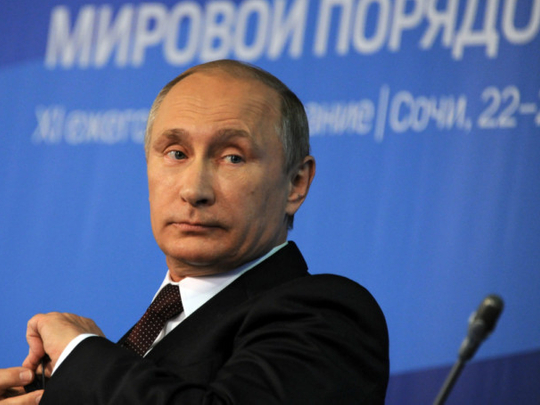
This year’s annual meeting of foreign Russia analysts with their Russian counterparts and Kremlin officials is something else entirely. It’s a businesslike, three-day affair devoid of illusions or pretences. Rather than debate, the Russians and many Americans and Europeans invited have talked past one another, starting from wholly incompatible understandings of the most basic facts of the Ukraine crisis and what it means.
The Russia on display is hardly chastened by US and European Union sanctions. The premise is that the loss of European investment and partners would be compensated for by new business and security ties with China. One top official warned that the former Soviet republic of Moldova — which ratified a Ukraine-style Association Agreement with the EU in July, and holds elections next month — could become a new area of conflict if it didn’t learn from the mistakes of Ukraine and Georgia. Vyacheslav Volodin, first deputy chief of staff for Vladimir Putin, dismissed the idea economic sanctions might in time wear down support for the president, pronouncing in Louis IV-style that “without Putin, there is no Russia.”
The world views of many participants have also started from very different assumptions. For many Americans and Europeans present, the question is how to preserve a post-Cold War order threatened by Russian aggression. Most Russians present assumed that order to be dead and concerned themselves with conjuring a new one. Russia seems to envisage a new settlement based on the Monroe Doctrine, introduced by US President James Monroe in 1823 to exclude Europe’s colonial powers from meddling in Latin America. Alexander Dynkin, director of the Institute of World Economy and International Relations in Moscow, provided a helpful slide show to describe what this might look like. It would no longer start from an assumption of (in his view bogus) universal values, but from the “balancing of interests” among great powers.
Dynkin’s map divided the world into several “micro regions” or neighbourhoods, with the US and European Union in one, Russia surrounded by a completed Eurasian Union in another, a third around China and a fourth comprising the countries of the Association of Southeast Asian Countries. “Some will say this is a step back,” he said, but it would in fact be a path to stability.
More than backward, the idea looks impracticable. For one thing, there is no ocean to separate potential spheres of influence on the Eurasian land mass from imperial competitors, as was the case for Latin America. So who would get Central Asia: Russia or China? Would Ukraine and Moldova go to Russia or the EU? Might China not claim Asean, where Putin visited Vietnam in September to revive military ties? How would the US fit in? Would the smaller countries involved submit — or react as Ukraine did?
Kremlin’s wider agenda
What this year’s Valdai Club shows, according to James Sherr, associate fellow at London’s Chatham House think tank, is that “Russia is not looking for some kind of off-ramp. They don’t see themselves as acting from a position of weakness, but of strength, and they are using events in Ukraine as a platform for a wider agenda.” That’s certainly the confidence that Russia’s leaders and foreign policy experts are trying to project. Still, a nervousness occasionally creeps in, a sense that big decisions for Russia’s future are being made on the hoof and just might not be sustainable. For example, the same economic statistics produced to show the relative decline of the US and EU shares in global gross domestic product (to 17 per cent and 14 per cent respectively by 2017, according to Andrei Klepach of Vnesheconombank, a Russian state bank), also showed Russia’s share declining (to 3 per cent or less, from 3.5 per cent today).
I see at least two conclusions. The first is that Russia is stumbling into a dependent alliance with China about which it should be extremely nervous. The second is that any “off ramp” from the Ukraine crisis will require Russia and the US to rediscover a common language and, belatedly, figure out how to accommodate Russia in a security structure that was designed to contain it. Judging by this year’s Valdai conference, that may take a long time — if it’s even possible.
— Washington Post
Marc Champion writes editorials on international affairs for Bloomberg View.









